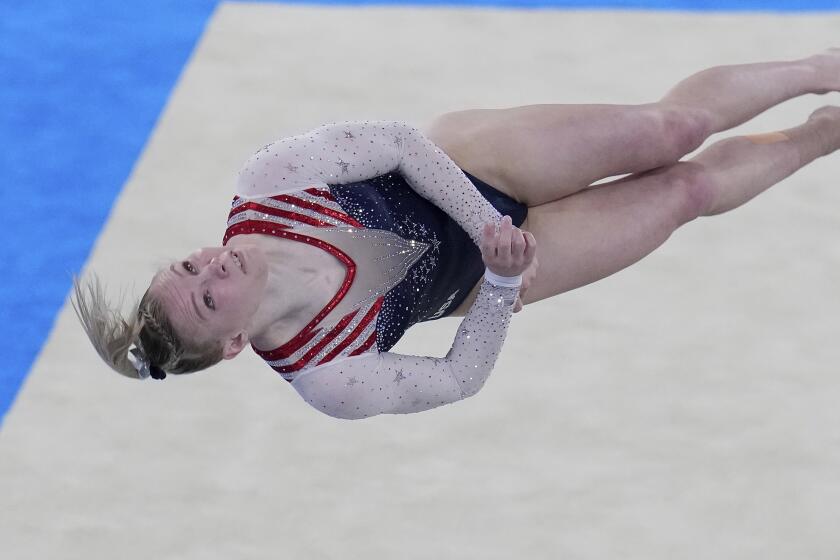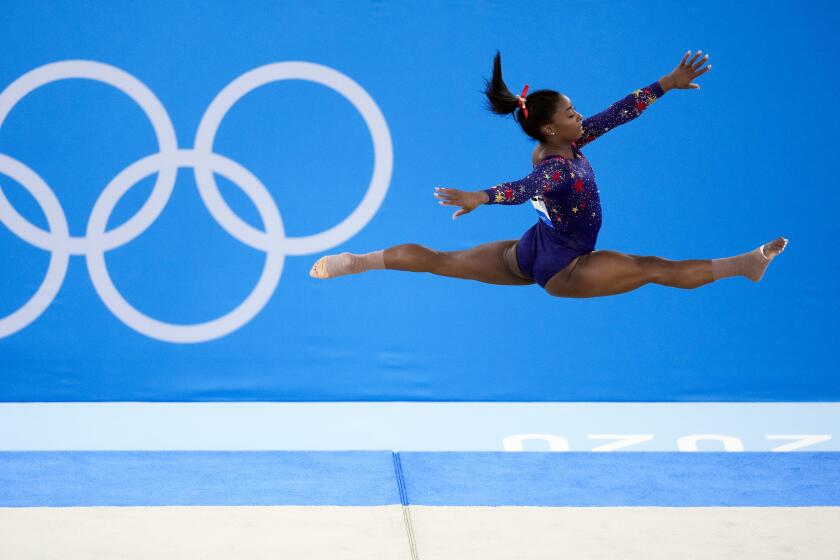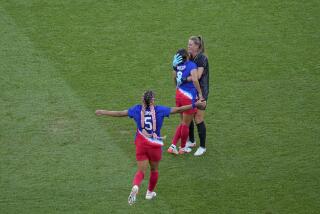Olympics loss to Canada could mean end of era for Carli Lloyd and USWNT
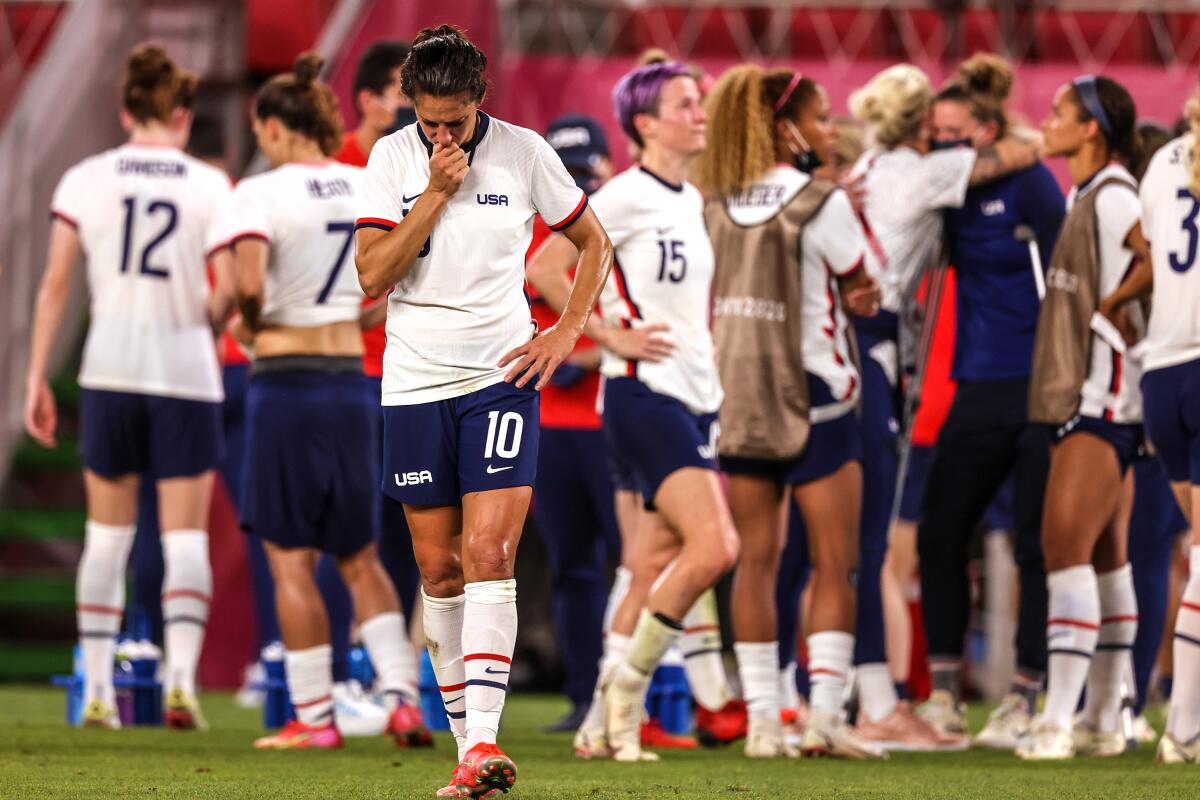
KASHIMA, Japan — Carli Lloyd didn’t want to leave the field Monday.
Her dream of another championship had ended in a 1-0 U.S. loss to Canada in the semifinals of the Tokyo Olympics. And if that meant the end of an era for Lloyd and the women’s national team — which it certainly did — Lloyd wasn’t going to go until she had one long, last look around.
So she grabbed a soccer ball, dropped it on the grass near midfield and sat alone, in the middle of the hot, steamy and empty stadium, long after everyone else had left the field.
“I’m not going to lie. I miss having a normal life,” said Lloyd, one of 11 players on the U.S. team older than 30. “I miss home, my family, friends. This is what you sacrifice every four years, every five years. It’s all part of it.”
Jade Carey wins Tokyo Olympic gold in the women’s gymnastics floor exercise Monday, beating Italy’s Vanessa Ferrari and Japan’s Mai Murakami.
The decision she’s been dreading, her words suggested, has already been made.
“Eventually, it comes to an end,” she said. “So just try to savor every moment.”
Not just for Lloyd, who turned 39 in Japan, but for the heart of the most successful women’s soccer team in history. Kelley O’Hara will turn 33 the day before the U.S. finishes the tournament against Australia in the bronze-medal game Thursday. Alex Morgan and Christen Press are both 32; Tobin Heath’s a year older.
How many of them will still be playing when the next Olympics open in three years?
“We don’t really have the luxury of going one year at a time. We kind of have to think in four-year blocks,” said Megan Rapinoe, who turned 36 last month. “And I haven’t thought about that.”
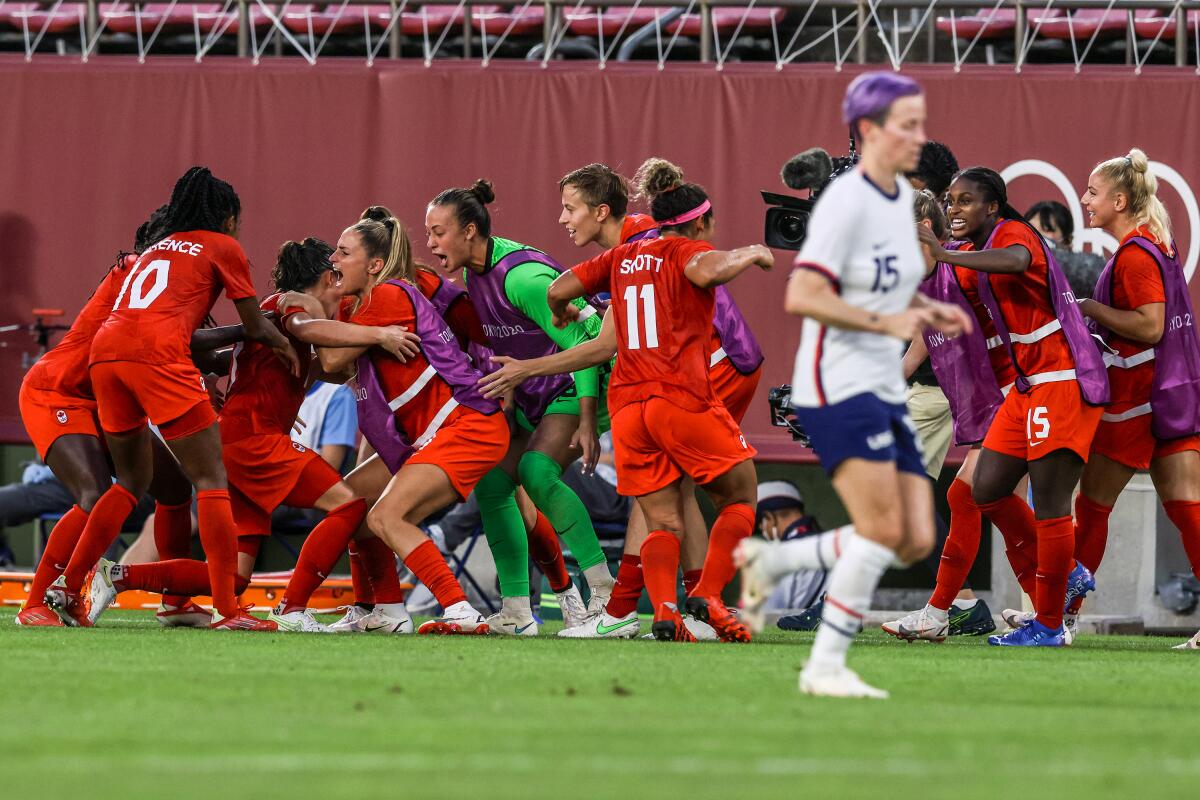
Nor has Becky Sauerbrunn, 36.
“It’s way, way too early for the reflection question,” she said.
But that question won’t go away, not with the way the Americans played in Japan.
They came to the Olympics riding a 44-game unbeaten streak, then lost twice in less than two weeks.
They rolled through the last two Women’s World Cups without a loss, becoming the third team of either gender to win consecutive world championships since World War II. But an aging core melted in the punishing heat and humidity of the Japanese summer.
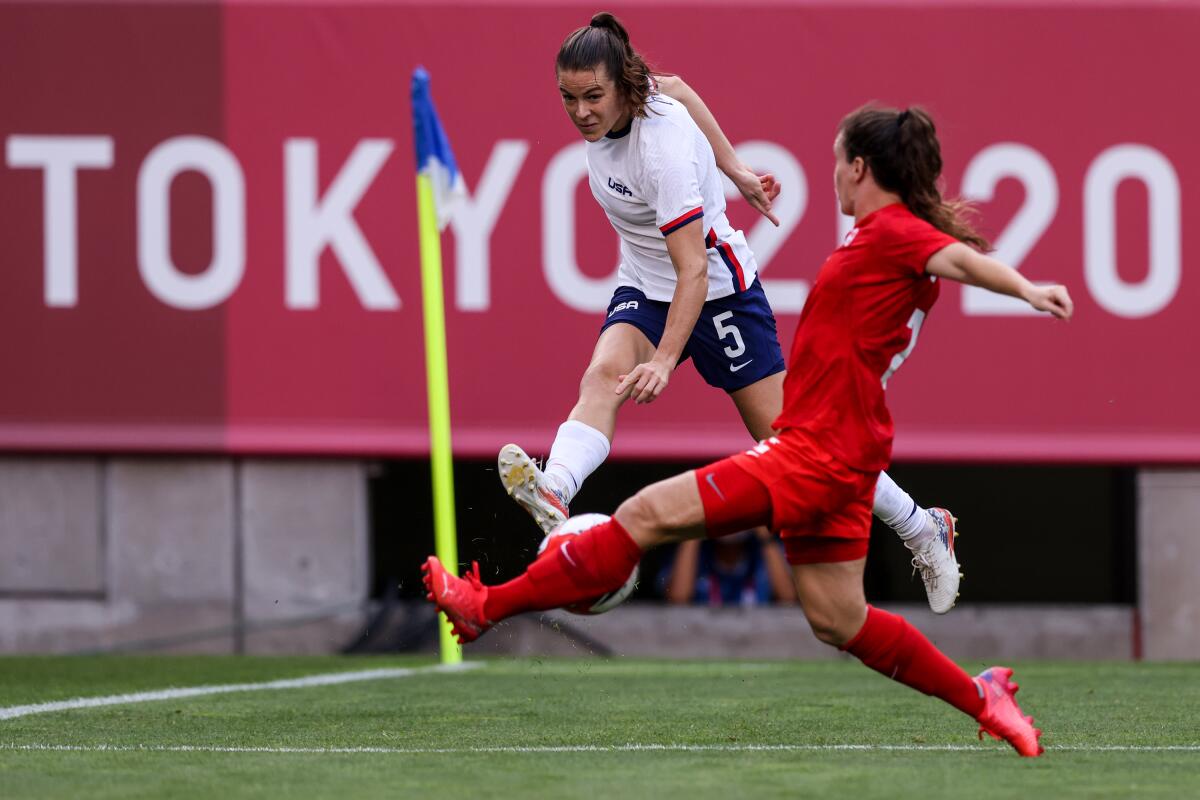
“Football always needs joy. That’s when the game is really played at its best,” Rapinoe said with a forced smile. “I feel like we haven’t been able to do that; everything has just been a little bit of a struggle.
“I certainly love playing with a big smile on my face much more than the opposite. I think everybody else does as well.”
Instead, the team stumbled, grim-faced, through the worst group stage ever by a U.S. women’s squad in a major world championship, then needed a superb effort by goalkeeper Alyssa Naeher, who saved three penalty kicks — and, briefly, her team’s tournament — to get past the Netherlands in the quarterfinals.
Naeher wasn’t around to face the penalty shot that decided Monday’s game, leaving in the 30th minute with a hyperextended right knee. Her replacement, Adrianna Franch, was playing in just her seventh game for the U.S., her first in a championship. And while her teammates did their best to protect her — Franch faced just one shot from open play — she was on her own when Jessie Fleming strode to the spot in the 75th minute.
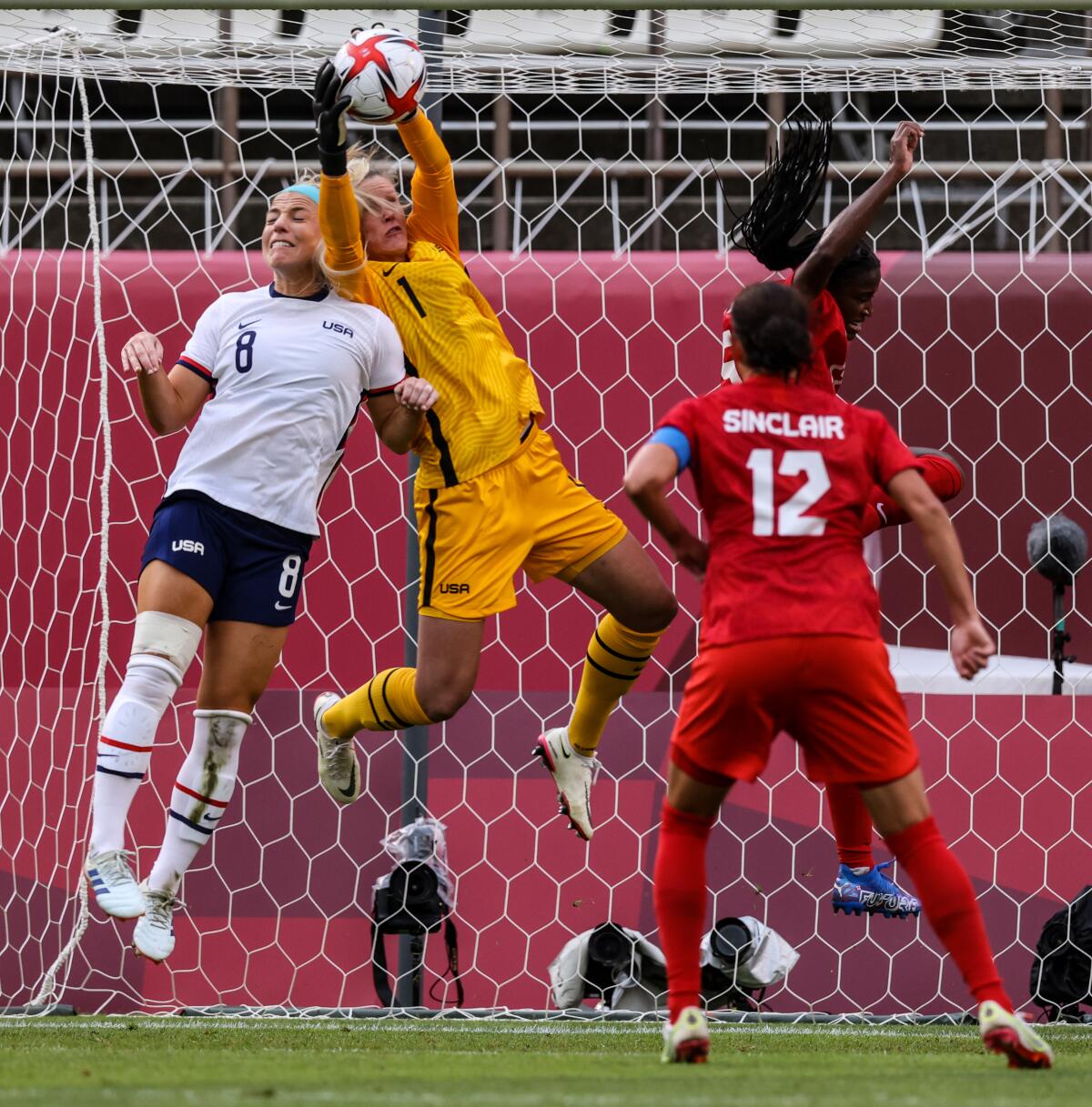
Canada’s Deanne Rose had tripped after running up the back of U.S. defender Tierna Davidson just inside the right edge of the penalty area moments earlier. Ukrainian referee Kateryna Monzul waved for play to continue before being stopped by the replay official, who urged her to look at video of the collision.
When she did, she overruled her own call and awarded the penalty.
Christine Sinclair, the only woman on either team who was in uniform the last time Canada beat the U.S., in 2001, walked the ball to the spot but rather than shooting against Franch, her club teammate with the Portland Thorns, she handed it to Fleming, a former UCLA standout, who calmly slotted it inside the right post.
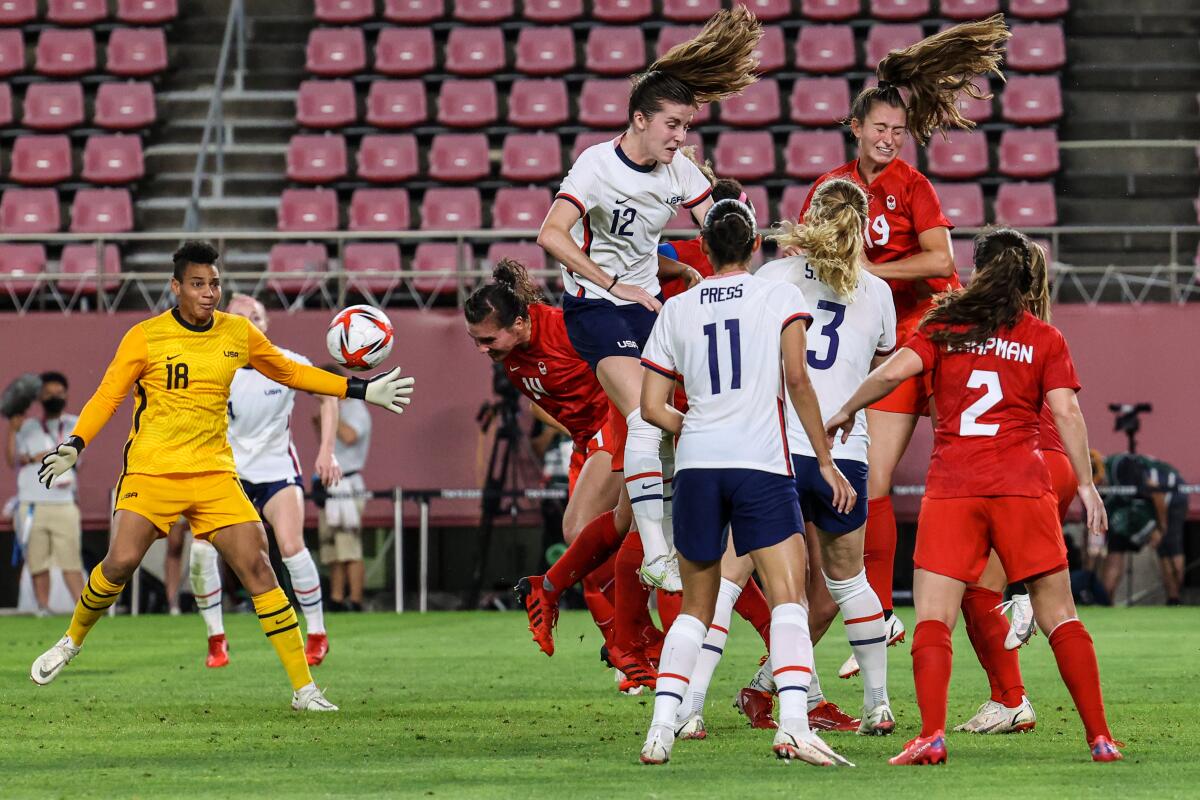
It was a dreadful way to lose. “Heartbreaking,” Lloyd said.
But then no one argued that the U.S., which was dreadfully sloppy throughout the Olympic tournament, deserved any better.
In 2012, Canada lost an equally painful Olympic semifinal to the U.S. on Morgan’s goal in the final second of the second overtime. Canada went on to win the first of consecutive bronze medals while the U.S. played in the gold-medal game for the last time.
“This is a big revenge for them. We wanted to change the script on that,” said Canadian goalkeeper Stephanie Labbe. “It’s been a long time coming. What a time for this to finally happen.”
Now it will be Canada and Sinclair, 38, chasing gold for the first time against Sweden while the U.S. plays for the first time in the third-place game of the Summer Games. After that, it will be time for the reflection question.
Simone Biles will compete in the event final for the balance beam on Tuesday after withdrawing from the team and all-around finals because of “the twisties.”
Lloyd, for one, would appear to have little left to accomplish. The two-time world player of the year trails one player in history in games played and her four World Cup and Olympic titles trail only Christie Rampone Pearce for most championships won by a woman.
Heath has four as well. Sauerbrunn, Morgan and Rapinoe each have three.
However, there’s still one game left to play in Japan. So after rolling the ball away, Lloyd walked slowly to the end line and, with no one watching, ran a series of wind sprints.
The end may be near, but she hasn’t gotten there yet.
“We’re not going to walk away with a gold medal, but I’d like to walk away with the bronze medal, at the very least,” she said. “So that’s all the focus for me.”
After that, it will be decision time for Lloyd and many of her teammates.
More to Read
Go beyond the scoreboard
Get the latest on L.A.'s teams in the daily Sports Report newsletter.
You may occasionally receive promotional content from the Los Angeles Times.

